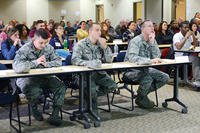The U.S. Department of Education's Office of Special Education and Rehabilitative Services (OSERS) announced more than $121 million in grants to help improve the outcomes of individuals with disabilities—from cradle through career. The investments are aimed at promoting inclusion, equity and opportunity for all children and adults with disabilities to help ensure their economic self-sufficiency, independent living and full community participation.
"These investments are significant in assisting individuals with disabilities to reach their full potential," said U.S. Secretary of Education Arne Duncan. "We want all individuals with disabilities to succeed and these investments symbolize our values and commitment as a nation toward achieving excellence for all."
Among the grants is $54 million from OSERS' Office of Special Education Programs (OSEP) to support research, demonstrations, technical assistance, technology, personnel development and parent-training and information centers. The OSEP grants include $8.7 million to WestED in San Francisco to create a Center for Systemic Improvement (CSI). The $8.7 million grant becomes the largest technical assistance (TA) investment ever funded by OSERS. The focus of this national center will be to provide assistance to states to help build their capacity to support local school districts and early intervention services programs in improving educational results and functional outcomes for children with disabilities. CSI will help states implement the Department's Results Driven Accountability framework by strategically delivering the assistance necessary to implement bold, innovative and systemic reforms that raise expectations for academic achievement and improve outcomes.
Besides special education, OSERS' Rehabilitation Services Administration (RSA) awarded $47 million to fund its comprehensive and coordinated programs of vocational rehabilitation, supported employment and independent living for individuals with disabilities. And, OSERS' National Institute on Disability and Rehabilitation Research (NIDRR) distributed $19 million to institutions of higher education and private and non-profit organizations for innovative, cutting-edge research projects.
Highlighted below are some of the key grants that will help improve outcomes for individuals with disabilities and assist those with disabilities in preparing for college and career.
Funded at $2.5 million, the National TA Center on Improving Transition to Postsecondary Education and Employment for Students with Disabilities (Transition Center) is the first major investment funded jointly out of RSA and OSEP to create a seamless transition process from high school through employment. The Transition Center, to be located at the University of North Carolina at Charlotte, will work with states, school districts, and vocational rehabilitation agencies to implement evidence-based and promising practices and strategies to ensure that students with disabilities, including those with significant disabilities, graduate from high school with the knowledge, skills, and supports needed for success in postsecondary education and employment.
Funded at $9 million for the next three years, the Job-Driven Vocational Rehabilitation TA Center (JDVRTAC) at the University of Massachusetts-Boston will assist state vocational rehabilitation agencies in developing training and employment opportunities for individuals with disabilities that meet the needs of today's employers and the demands of the local economy. This award, along with the passing of the Workforce Innovation and Opportunity Act (WIOA), will provide greater access to employment, education, job-driven training, and support services that give individuals with disabilities the chance to advance their careers and secure the good jobs of the future.
Funded at $2 million, the PROMISE Technical Assistance Center, to be located at the Association of University Centers on Disabilities in Silver Spring, Maryland, will provide technical assistance to states participating in the PROMISE model demonstration projects to help improve services and supports to children with disabilities who receive supplemental security income (SSI) and their families. Last year, OSERS awarded more than $211 million to five states and a consortium of six states to establish and operate the PROMISE model demonstration projects. These projects will help child SSI recipients achieve better outcomes, including graduating from high school and college and becoming career ready.
Funded at $3.2 million, the IDEA Data Fiscal Center at WestEd in San Francisco is designed to help states collect and report accurate fiscal data, including ensuring states and school districts adequately fund special education and related services for students with disabilities.
Funded at over $2.9 million, The Leadership Consortia in Sensory Disabilities and Disabilities Associated with Intensive Service Needs program will support two leadership training consortia to prepare doctoral-level leaders in special education, early intervention, and related services. Each university consortium, at Vanderbilt University in Nashville and Salus University in Pennsylvania, will prepare doctoral-level leaders with highly specialized skills, knowledge, and expertise in sensory disabilities or students with disabilities with intensive service needs, respectively. The consortia will prepare leaders who can act effectively in leadership positions in universities, state educational agencies, local educational agencies, lead agencies, early intervention services programs, or schools.
Funded at over $11.6 million, the Special Education—Personnel Development to Improve Services and Results for Children with Disabilities Program provides funds at various locations to help address state-identified needs for highly qualified personnel in special education, related services, early intervention, and regular education programs that serve children with disabilities. Funding will help train educators in such areas as: early intervention, early childhood; low-incidence disabilities; related services, speech/language and adapted physical education and secondary/transition—all with the goal to improve results and outcomes for children with disabilities.
Funded at over $6.5 million, grants were awarded to 23 states to operate 23 Parent Training and Information (PTI) Centers for parents and families of students with disabilities. With the new grants, the Department now funds 96 information centers for parents of children and youth with disabilities. Every state has at least one PTI that assists parents as they work to ensure their children receive a free, appropriate public education as guaranteed by federal law. The centers provide parents with the training and information they need to work with professionals in meeting the early intervention and special needs of children with disabilities. Many parent information centers work closely with state and local school systems to engage parents in working collaboratively to improve outcomes for their children. For a list of U.S. Department of Education-funded parent training and information centers, visit www.parentcenterhub.org.
Funded at over $875,000, the University of Illinois at Chicago will support research and training to improve the supports critical for family caregivers.
Funded at $950,000, Gallaudet University will support research and training to improve the accessibility, usability, and performance of technology for individuals who are deaf and hard of hearing.
Funded at $875,000, TransCen, a non-profit organization dedicated to improving educational and employment outcomes for people with disabilities, will support research and training to improve vocational rehabilitation practices for youth and young adults with disabilities.





